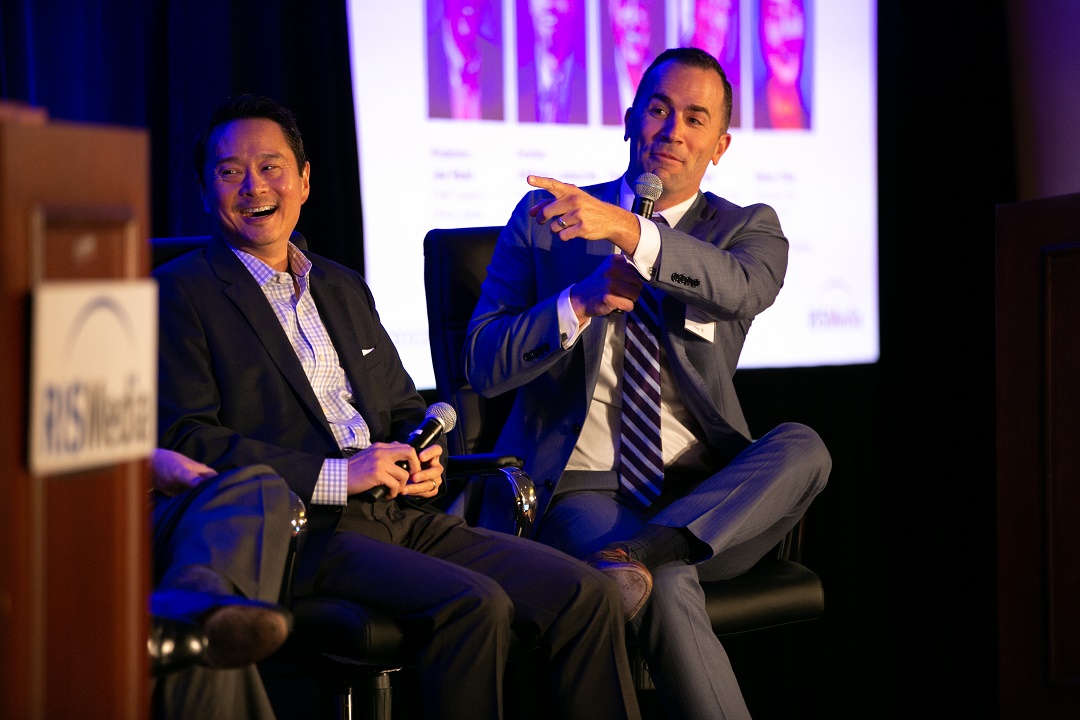(Above) At RISMedia’s 2019 Real Estate CEO Exchange, Simon Chen, Executive Vice President of Product & Innovation at Realogy, left, and Anthony Lamacchia, Broker/Owner of Lamacchia Realty, Inc. on the panel at Tuesday’s session, “iBuyers: Fight the Threat or Embrace the Trend?” (Credit: Korin Krossber of PlanOmatic)
As iBuyers continue to infiltrate markets throughout the country, there’s been a lot of talk surrounding the movement and what it means for real estate professionals and consumers alike. Is it a threat to the real estate industry as we know it? Is it a fad that will simply run its course in due time? Or is it something that real estate professionals across the board should embrace wholeheartedly as the future unfolds? These questions and more were discussed in-depth during the “iBuyers: Fight the Threat or Embrace the Trend?” session at RISMedia’s 2019 Real Estate CEO Exchange that kicked off in New York City yesterday.
Addressing the audience of more than 300 brokerage executives and industry leaders, Bob Hale—president and CEO of the Houston Association of REALTORS® (HAR)—kicked things off by looking at the cold hard facts.
A recent consumer survey that dealt with iBuyer programs conducted by the Association found that:
– 33 percent of respondents are aware of the term, even though it’s only been on the market for less than seven years.
– 41 percent of current sellers would consider working with an iBuyer.
– 92 percent of consumers work with and want to work with a REALTOR®. Even if they did an iBuyer program, they want a REALTOR® to represent them.
“What we need to pay attention to though is the fact that 80 percent of respondents are interested in seeing how much an iBuyer would offer,” said Hale, who is committed to informing and educating HAR members as to how different iBuyer programs operate.
While it’s clear that the instant-offer notion that’s central to the iBuyer movement is appealing to today’s consumers—as well as the fact that no listing, prep work or showings are incorporated into the mix—brokerages are embracing the trend in their own unique way.
“We don’t consider ourselves iBuyers; however, we do provide our sellers the option to sell quickly,” explained Anthony Lamacchia, broker/owner of Lamacchia Realty, Inc.
Having launched the day after Christmas, the brokerage’s Offer Now Program gained a lot of attention right from the get-go. Addressing the needs of homeowners who want or need to bypass the open market, the program provides a contingent-free, no obligation cash offer on the client’s home with a flexible closing date.
“What surprised me most was the fact that the leads coming in through the program were regular sellers, not necessarily people in desperate situations,” explained Lamacchia, who was also caught off guard by the fact that there’s a higher percentage of people out there willing to take less for their home.
Keeping the spirited panel moving, moderator Joe Rand—chief creative officer at Better Homes and Gardens Real Estate Rand Realty—likened taking advantage of an iBuyer offer to trading in your car vs. selling it privately. While you’re ultimately taking a hit on price, you’re gaining a significant level of convenience.
“The attraction to convenience is bigger than I thought, so that’s why we want to be able to provide this option,” noted Lamacchia.
“iBuyer is the sexier, cooler way of packaging ‘We buy your home for cash,’” explained Faisal Susiwala, broker of record at RE/MAX Twin City Faisal Susiwala Realty in Cambridge, Ontario. “It’s packaged in a modern way where millennials will understand it; however, when it comes to real estate, there still needs to be the physical and emotional aspect that comes with the home-buying and -selling process, which comes from working with a real estate professional.”
While the iBuyer trend hasn’t necessarily made its way to Canada as of yet, Susiwala has a 90-day guarantee program in place in order to help his buyers facilitate the purchase of a home.
For Simon Chen, executive vice president of Product & Innovation at Realogy, “it’s all about being upfront, letting clients know exactly what their options are and that we’re there to guide them and support them through doing what’s right for them.”
As the iBuyer movement continues to gain steam, Chen explained that the ERA Sellers Security® Plan—which has been around since the ‘70s—is making a revival.
“More significantly though, we haven’t had to buy any homes through our ERA Express Sell 30-day program or 10-day Catalyst program within the past two years, because we’re selling homes,” said Chen.
While Rand believes iBuyers are an “arrow every agent should have in their quiver,” only time will tell how the iBuyer movement stands to shake up the real estate process as we know it.
“At the corporate level, every real estate company should have an iBuyer program available,” agreed Susiwala.
“The new entrants coming into the market are either representing themselves or the investor, so their motivation is different than getting the highest and best price,” added Chen.
“In the end, the goal is to protect the REALTOR®,” said Hale, “so we need to focus on ways to keep the REALTOR® in the middle prior to the consumer getting to the iBuyer.”
For CEO Exchange continuing coverage, follow @RISMediaUpdates and visit RISMedia.com.
 Paige Tepping is RISMedia’s managing editor. Email her your real estate news ideas at paige@rismedia.com.
Paige Tepping is RISMedia’s managing editor. Email her your real estate news ideas at paige@rismedia.com.












